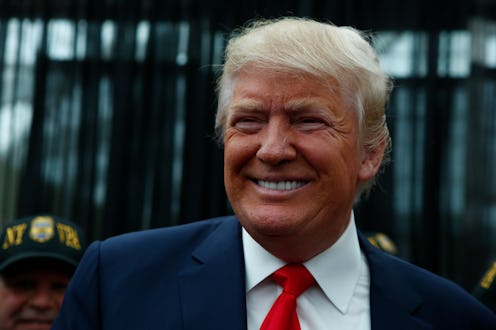News
Don't Buy Trump's New York Hype Just Yet
The night of Tuesday, April 19 will be a big one for both Democrats and Republicans, with victories anticipated for both parties' presidential frontrunners ― former Secretary of State Hillary Clinton and billionaire businessman Donald Trump. Clinton currently leads by an average of 13 points in the state, while Trump is up by even more, with a polling average nearly 30 points higher than his closest rival. But don't get sucked into the hype; if Donald Trump wins New York, it's not a comeback. It'll just be what was assured when the primary schedule was drawn up.
Trump, of course, is the author of a book called The Art of the Comeback, so you could pretty easily see him making this argument ― if it weren't for the fact that claiming a comeback means admitting a setback in the first place, and he's probably not very keen on that. But in case any Trump-friendly pundits or outlets are trying to sell you on this idea, don't buy it.
Here's the simple truth: Once the race got down to the trio of Trump, Ted Cruz, and John Kasich, New York was always going to be a haven for the real estate mogul. Beyond simply being his home state, his polling numbers there have been pointing to a blowout win for months.
Looking for proof? Just check out The Huffington Post's New York GOP primary tracking poll, which shows where the numbers were clear back to last summer, when the campaigning started in earnest. In June of 2015, the very month Trump entered the race, he was trailing in the state to names like Bush, Walker, and Rubio, sure. But by the time January 2016 rolled around, with the race well and truly underway, he'd opened up a double-digit lead.
By February, Trump was up on Cruz by more than 20 points, and in a few months (perhaps aided by Cruz flubs, like his bewildering "New York values" remark), he's widened that lead to more than 30.
The point is, that's not what a "comeback" looks like. For a comeback, your victory has to look uncertain, if not unlikely, before a roaring charge in the final days secures you the win. In Trump's case, this is just a case of slow-rolling, entirely predictable success.
Frankly, this sort of thing is always important to bear in mind, because the notion of "momentum" in politics has its fair share of problems. While some people might have told you that it was Cruz who had all the momentum heading into the Empire State on the heels of his double-digit win in Wisconsin, that's a rather misleading way of looking at it. Winning a race in Wisconsin with the full support of basically the entire state Republican Party, from its popular conservative governor on down, did not fundamentally change everything about the GOP race. If anything, it only let's Trump spin a revival narrative after Tuesday night.
And the New York polls have been telling us that all along! Basically, it's very unclear whether momentum is a concept with any validity or value in politics, and that's been evidenced in the Democratic primary race, too. Despite rattling off a seemingly impressive streak of state wins, it's not really true that Vermont senator Bernie Sanders has any dramatic "momentum" going for him; he just finally hit some parts of the map that favored him. And of course, he still trails Clinton by more than 200 delegates heading into Tuesday.
In other words, it's sometimes easy to get caught up in the same arguments that the campaigns themselves often make ― that everything is uncertain and volatile, and that an underdog can come out of nowhere to win. And to some extent, that's true (just ask the Clinton campaign about Michigan). But more often than not, momentum narratives boil down to which state contest happens which week, and whether they're ordered in an advantageous way for a given candidate.
It'll be interesting to see just how big a score Trump can run up on Tuesday, to say the least. If he actually wins by such a staggering margin, he could have a shot at a delegate sweep. Just remember: Don't let anyone get away with telling you that this says something bigger about the race, or that you should be surprised.
Donald Trump, suffice to say, is no comeback kid.
